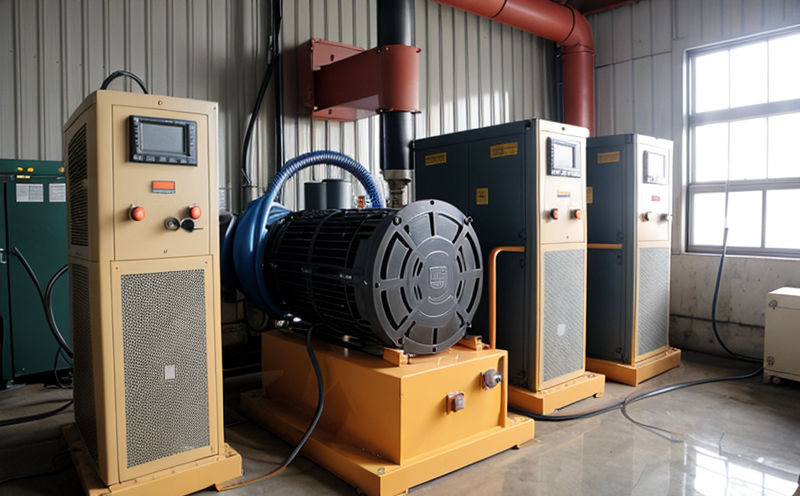IEC 60994 Insulation Resistance Testing of Power Generators
The IEC 60994 standard is a crucial document in the power sector, providing guidelines for the performance and safety of electrical equipment used in power generation. One critical aspect of this standard pertains to insulation resistance testing, which ensures that the insulating materials within power generators are capable of withstanding high-voltage stresses without degrading or failing.
Insulation resistance is a key parameter indicating the integrity of insulation systems and helps prevent electrical breakdowns, short circuits, and other failures that could lead to severe accidents in power generation facilities. The IEC 60994 standard specifies methods for determining the insulation resistance of rotating machines used in power generation.
The testing procedure outlined by this international standard involves applying a specified test voltage across the insulating materials for a given duration and then measuring the resulting current flow. This measurement helps to assess the overall condition of the insulation, detect potential weaknesses, and ensure compliance with safety regulations. By adhering to these standards, power generation equipment manufacturers can enhance product reliability and minimize risks associated with electrical hazards.
Before conducting IEC 60994 testing, it is essential to prepare the specimen properly. This includes cleaning the surfaces of the generator components thoroughly, ensuring there are no foreign materials that could interfere with the test results. It's also important to ensure that all connections are secure and free from any loose wires or damaged parts.
The instrumentation used for this testing typically consists of a high-impedance voltmeter and an ammeter capable of measuring very low currents accurately. A constant voltage source is applied across the specimen, and the current flowing through it is measured simultaneously. The ratio between these two values gives us the insulation resistance.
The acceptance criteria for IEC 60994 testing are stringent and vary depending on the specific type of generator being tested. For instance, larger generators often require higher levels of insulation integrity compared to smaller units due to their increased surface area exposed to potential hazards. Compliance with these standards ensures consistent quality across all power generation facilities.
Regular inspections and maintenance based on IEC 60994 guidelines contribute significantly towards extending the lifespan of power generating equipment by identifying issues early on before they escalate into more significant problems requiring extensive repair or replacement. Implementing such practices not only enhances operational efficiency but also contributes to environmental sustainability by reducing waste generation associated with premature failures.
Understanding and implementing IEC 60994 insulation resistance testing is vital for ensuring the safety, reliability, and longevity of power generators across various applications including renewable energy sources like wind turbines and solar inverters. By adhering strictly to these standards during design, manufacturing, installation, and periodic checks, organizations can maintain high levels of performance while minimizing risks related to electrical hazards.
Quality and Reliability Assurance
- The testing process ensures that the insulating materials within power generators are capable of withstanding high-voltage stresses without degrading or failing.
- This is critical for preventing electrical breakdowns, short circuits, and other failures that could lead to severe accidents in power generation facilities.
Compliance with IEC 60994 standards helps manufacturers enhance product reliability and minimize risks associated with electrical hazards. Regular inspections based on these guidelines contribute significantly towards extending the lifespan of power generating equipment by identifying issues early on before they escalate into more significant problems requiring extensive repair or replacement.
| Test Parameter | Description |
|---|---|
| Test Voltage | The specified test voltage is applied across the insulating materials for a given duration. |
| Measuring Current Flow | The resulting current flow is measured simultaneously to determine insulation resistance. |
| Specimen Preparation | Cleaning surfaces of generator components, ensuring all connections are secure and free from any loose wires or damaged parts. |
The acceptance criteria for IEC 60994 testing vary depending on the specific type of generator being tested. Larger generators often require higher levels of insulation integrity compared to smaller units due to their increased surface area exposed to potential hazards. Compliance with these standards ensures consistent quality across all power generation facilities.
Customer Impact and Satisfaction
- Ensures the safety, reliability, and longevity of power generators used in various applications including renewable energy sources like wind turbines and solar inverters.
- Helps manufacturers enhance product reliability and minimize risks associated with electrical hazards.
- Contributes significantly towards extending the lifespan of power generating equipment by identifying issues early on before they escalate into more significant problems requiring extensive repair or replacement.
By adhering strictly to these standards during design, manufacturing, installation, and periodic checks, organizations can maintain high levels of performance while minimizing risks related to electrical hazards. This not only enhances operational efficiency but also contributes to environmental sustainability by reducing waste generation associated with premature failures.
Achieving compliance with IEC 60994 testing procedures demonstrates a commitment to quality assurance that resonates positively among customers who value safety and reliability in their power generation equipment.
Use Cases and Application Examples
| Use Case/Application Example | Description |
|---|---|
| Renewable Energy Sources | Wind turbines and solar inverters require regular testing to ensure they meet IEC 60994 standards for insulation resistance. |
| Synchronous Generators | Larger synchronous generators used in power plants must comply with strict insulation resistance testing requirements as per IEC 60994 guidelines. |
| Alternating Current (AC) Motors | AC motors within power generation facilities should undergo periodic inspections to check their compliance with the specified standards. |
The use of IEC 60994 insulation resistance testing ensures that all types of generators used in power generation meet stringent quality assurance criteria. This is particularly important for renewable energy sources where even small failures can have significant environmental impacts. By maintaining high levels of performance and reliability, organizations can prevent accidents and ensure sustainable operations.





